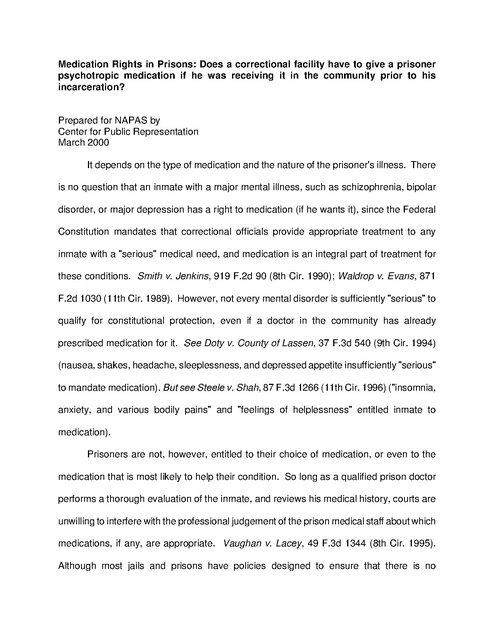Cntr for Public Representation Medication Rights in Prisons 2000
Download original document:

Document text

Document text
This text is machine-read, and may contain errors. Check the original document to verify accuracy.
Medication Rights in Prisons: Does a correctional facility have to give a prisoner
psychotropic medication if he was receiving it in the community prior to his
incarceration?
Prepared for NAPAS by
Center for Public Representation
March 2000
It depends on the type of medication and the nature of the prisoner's illness. There
is no question that an inmate with a major mental illness, such as schizophrenia, bipolar
disorder, or major depression has a right to medication (if he wants it), since the Federal
Constitution mandates that correctional officials provide appropriate treatment to any
inmate with a "serious" medical need, and medication is an integral part of treatment for
these conditions. Smith v. Jenkins, 919 F.2d 90 (8th Cir. 1990); Waldrop v. Evans, 871
F.2d 1030 (11th Cir. 1989). However, not every mental disorder is sufficiently "serious" to
qualify for constitutional protection, even if a doctor in the community has already
prescribed medication for it. See Doty v. County of Lassen, 37 F.3d 540 (9th Cir. 1994)
(nausea, shakes, headache, sleeplessness, and depressed appetite insufficiently "serious"
to mandate medication). But see Steele v. Shah, 87 F.3d 1266 (11th Cir. 1996) ("insomnia,
anxiety, and various bodily pains" and "feelings of helplessness" entitled inmate to
medication).
Prisoners are not, however, entitled to their choice of medication, or even to the
medication that is most likely to help their condition. So long as a qualified prison doctor
performs a thorough evaluation of the inmate, and reviews his medical history, courts are
unwilling to interfere with the professional judgement of the prison medical staff about which
medications, if any, are appropriate. Vaughan v. Lacey, 49 F.3d 1344 (8th Cir. 1995).
Although most jails and prisons have policies designed to ensure that there is no
interruption in the medication of a newly admitted inmate, many facilities are reluctant to
provide inmates with certain drugs, such as the newer antipsychotics or the
benzodiazepam tranquilizers, because of cost or security considerations. See Wolfel v.
Ferguson, 689 F.Supp. 756 (S.D. Ohio 1987); Mathis v. Cotton, 1997 WL 457514 (N.D.
Tex. 1997). Further, the procedures used to determine what medications are appropriate
ofter result in delays before the inmate receives treatment. See Mahan v. Plymouth County
House of Corrections, 64 F.3d 14 (1st Cir. 1995). Many institutions will also substitute
cheaper medications, which are on their formulary, for the medicine that was prescribed by
the treating physician in the community. These kinds of practices are not generally
unlawful. See Bridges v. Jennings, 1998 WL 223276 (10th Cir. 1998)(upholding refusal to
continue prescribing Xanax to addicted inmate); Lewis v. Plummer, 1997 WL 168530 (N.D.
Calif. 1997)(prisoner not entitled to Valium which he was taking prior to his incarceration);
Lawthorn v. Duckworth, 736 F.Supp. 1501 (N.D. Ind. 1987)(prison policy of limiting use of
Valium because its value outweighed by the risk of offenders hoarding and selling it in the
prison). However, if a prison terminates medication, care must be taken to ensure that the
dose is gradually reduced when this is medically appropriate. See Mathis, supra (inmate
experienced seizure when Valium abruptly terminated).





